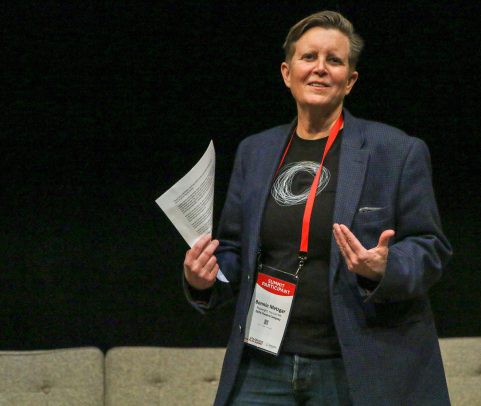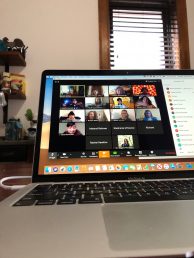Show must go on: Theatre class collaborates virtually to create ensemble project

Bonnie Metzgar, associate professor in UIC’s School of Theatre and Music, is an accomplished playwright, director, dramaturg, producer and former artistic director of About Face Theatre. At UIC, Metzgar teaches Stage Direction (THTR 333), where they break down the skills necessary to be a director.
Among these skills is the director’s ability to build an ensemble out of the performers, so that everyone is inside the artistic vision. Over the course of the semester, the students read five versions/adaptations of the Greek tragedy “Antigone” across a wide horizon of aesthetics, using them as the basis of exercises to build skills. Then, the students chose a scene from any “Antigone” text for their final project and had to determine, as an ensemble, how they could weave their scenes together to tell their story of “Antigone,” which they dubbed “Antigonstein.”
“Then came COVID-19,” Metzgar said. “The question became, ‘How could we continue our work on this big collaborative final project where all the students were the performers in each other’s final project?’”
According to Metzgar, they met together on Zoom and set up a highly tweaked rehearsal schedule with three breakout rooms running at all times during class.
Because “Antigonstein” included expansive choral sequences, some of the rehearsals required all the students to work together at the same time. Other students decided to meet on their own to get the timing and effects right. Students used multiple recording strategies for their scenes: some rehearsed over Zoom and recorded the scene live on Zoom with all performers synchronously.
Others recorded video and audio separately on Zoom and had each performer record themselves on their devices, then edited together a combination of multiple live performances.
Another strategy was to have individual performers upload many short videos of each line, then piece the entire scene together with complex video effects in post-production. One student liked the decay effect of recording the live performance with her phone as she watched it glitch on her computer screen.

Matanel Roitman, who graduated in May with a BFA in acting, said that even though he and the other students had come up with a vision to direct their pieces for the stage, when COVID-19 happened, those plans were scrapped.
“What really impressed me was the collective creativity the group had, having to change so many things in what seemed like a short time, as well as figuring out tech issues and how best to edit pieces,” Roitman said. “We really jumped on the task and came out of it with a piece that we can be proud of creating in this time.”
Once the students started to see the work that their collaborators were making, it really caught fire, Metzgar said. One crucial moment came when a student, Joseph Johnson, showed his edit of the opening sequence, where he boldly inserted found audio that questioned our ability to control our own mind and created the visual language of the dripping numbers that was picked up and revised by the student-director team of Roitman and Joe Sullivan for the recurring choral sequences throughout.
All the students submitted early rough drafts of their videos, which were viewed by everyone during class for feedback. After the feedback session, many scenes were re-edited, re-recorded or were augmented with a new layer as the students became interested in threading ideas or obsessions of other scenes into their own.
Roitman said a key thing that helped the project was that Metzgar was accommodating and a “great source of guidance.”
“Giving us directors the creative freedom to make our pieces our own while also helping to tie them all together to a cohesive presentation helped anchor us to what needed to happen,” Roitman said.
According to Metzgar, students connected intimately with Antigone, as she spends her final days entombed in a dark place, alone.
“The resonance with the themes of isolation, sacrifice and the desire for personal freedom from an oppressive state as the students were trapped in their homes during COVID-19 gave them an artistic outlet to explore ways to express what they were feeling and experiencing themselves,” Metzgar said. “You can feel the urgency pulsing through ‘Antigonstein.’ I am inspired by their tenacious pursuit of using the technology to tell this ancient story during this pandemic.”
Student directors/ensemble include: David Hernandez, Joseph Johnson, McKeely Malas, Vic Mallari, Alexis Tornez Martinez, Gretchen Minzenberger, Stephanie Munoz, Matanel Roitman, Jasmine Seals, Daliate Solomon, Joseph Sullivan, Priscilla Zanni Bertran, Freddie Zimmerman, Sam Magana Plascencia, Marcel Dizon, Richard Nowak and Karla Corona.
See the final project: https://theatreandmusic.uic.edu/newsdetails/790/777
